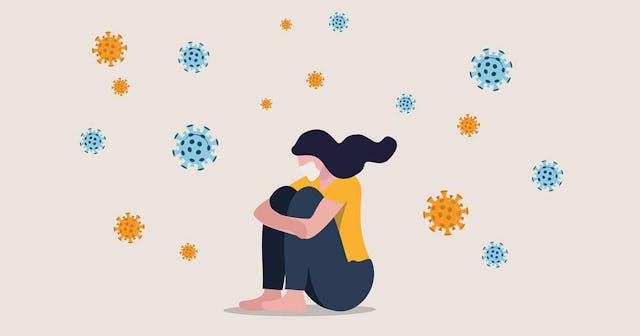People With Pre-Existing Anxiety Are Having An Especially Rough Time Right Now

I’m sitting here trying to describe the impact COVID-19 has had on my mental health, and I’ll be honest, I’m struggling to find the words. When my world changed a few weeks ago, I spent most of the time just trying to get my balance. I had to figure out what I should and shouldn’t believe online. Then I assessed the danger. The reality of it all. Then I figured out how to teach my children while working from home. All of it hit me like a wave. It’s only been in the past few days that I’ve had a moment to feel.
I’ve lived with pretty nasty anxiety and depression for as long as I can remember, so I suppose I should have the resources and medication to make this all a little more manageable, but like so many people with mental illness in the middle of a pandemic, I’m struggling. And sure, most people are feeling anxiety right now. That’s normal considering the situation. But if you are like me and already have a pre-existing anxiety disorder, this pandemic has only compounded something that’s difficult to live with even under normal circumstances.
To be honest, I don’t know if I’ve ever prayed so fervently for the well-being of my family and friends. These are long, thoughtful prayers that come from a place of simple need to keep my family safe and secure. I don’t know if I’ve ever slept so fitfully, or longed to go back to my simple, trustworthy routine. I don’t know if I’ve checked in on so many people in my entire life as I have in the past few weeks.
And to be real, I’m pretty fortunate right now. I have family in the home, so I’m not alone. I have a job that could be moved online, and I live in a rural area with very few COVID-19 cases. The last thing I want people to interpret from this post is that I’m ungrateful, because I’m not. Logically, I know how fortunate I am right now.
Despite that, my anxiety disorder has made this difficult time one of the hardest situations of my life. And I have a feeling there are many of you out there who are like me, trying to navigate their emotional instability in the middle of a pandemic. I want you to know that you are not alone, and that there are resources available to you.
Many psychotherapists and health plans are offering telehealth visits during this time. In fact, I’ve been meeting with my therapist this way. I have an online appointment with my psychologist soon to reassess my medications. If you have never met with your therapist online, I will say it takes some getting used to. It can also be difficult to find a place in your house where you can speak candidly with your therapist — especially right now, when every single member of your household is always home. I’m not a huge fan of trying to talk about my fears and anxieties with my family listening, so I try not to meet with him at the kitchen table. But with enough planning, it’s doable. However, be sure to check with your insurance provider to see if they have any hangups about covering online meetings.
If you work for or are a student at a university, this is a great time to look into their mental health service options. Most universities are ramping up their online options to meet the needs of their students and faculty during this difficult and uncertain time — like this example from The University of Hawaii.
Now, if you are in a situation where you lost your job and your insurance, realize that most public health services and crisis hotlines are deemed essential and are still operating. But if that isn’t an option for you, John Sharp, MD, writing for Harvard Health Publishing, suggests drawing on what you’ve already learned about managing your anxiety. “If you’re a human who’s been challenged, or somewhat disabled, by anxiety in the past, I encourage you now to draw upon what you’ve learned in terms of how you can manage successfully,” says Dr. Sharp. Just because the situation is different doesn’t mean that the skills you have acquired to manage anxiety won’t still be effective.
Dr. Sharp goes on to say: “Separating out feelings from the past, reminding yourself that you have the strength and ability in the present to prevail, seeing a path forward for yourself and setting yourself upon that path is the way forward. If along that way you should stumble and fall, picture yourself as able to pick yourself back up and carry on. Reassure yourself that the basic provisions for your safety and well-being are within your power to meet. In my book, every day that you are able to do so counts as a very good day indeed.”
If you are struggling with pre-existing anxiety during a pandemic, I hope it comforts you to know that I, along with a lot of others, are right there with you. Please realize that there is still help around you, even if the method of obtaining it looks a little different than usual.
And if you know someone else who struggles on a regular day, check in on them. They need you now more than ever.
This article was originally published on